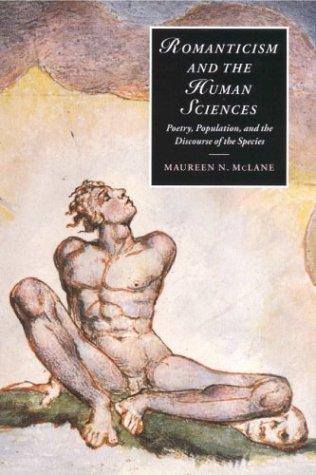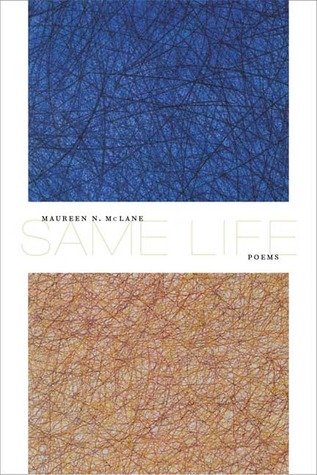Poetry Review: Portrait of a Predicament
I wouldn’t be writing this review or asking you to read this book if I didn’t believe that McLane were up to something far more radical and also far more difficult to reckon with—something I am not even sure I can account for. The most significant quality of the poetry in “World Enough” is a profound and unapologetic ambiguity.
Important Reminder — Two Weeks Left to Register: An opportunity, via two workshops, to work on the art of verse with Arts Fuse Poetry Critic Daniel Bosch.
World Enough by Maureen N. McLane. Farrar Straus Giroux, 2010, (first paperback edition, 2011), 134 pgs, $16.
By Daniel Bosch
World Enough is a serious and deliberate second volume of poems by Maureen N. McLane. Its seriousness (at times playfully expressed) resides in its portrayal of the situation of contemporary women with regard to the possibility of ethical action and expression in an environment they did not have an equal share in building. (To be sure, similar environmental predicaments may be understood to apply to disenfranchised contemporary men, but we would miss the heart of McLane’s project if we did not see World Enough as feminist.)
The deliberateness of the book resides in its thoroughgoingness. World Enough is a longish book of poems (well over 100 pages), as if to say that McLane’s world cannot be portrayed in digest form, that her world’s character can be absorbed only by persistent reencounter. So she has recast her predicament in poem after poem, in widely variant verse modes. The book contains nine substantial sequences and many poems of two to three pages, though many readers will feel that McLane is perhaps at her strongest in short and short-lined forms. Here is love lyric and brief ekphrasis. Here is revamping of dominant received forms, Modernist and pre-modern. Locales shift from New England to Upstate New York to Paris; points of view shift from slightly randy tourist (“Flaneuse”) to art colonist-ruminator (“Saratoga August”) to long-term resident literary scholar who has made a study of the flora and the fauna (“Passage II”). World Enough’s panoply might be a subtle rejoinder to its title: poems are not the world, but surely here are “poems enough.” (More on the title later.)
Yet this kind of complexity is de rigueur. Any artistic project that demonstrates that the world is complex—as if this were news—implies a naïve starting point. Poems that do only this cannot sustain our interest, because humans’ confusion at the revelation of layering and instability is banal. I wouldn’t be writing this review or asking you to read this book if I didn’t believe that McLane were up to something far more radical and also far more difficult to reckon with—something I am not even sure I can account for. The most significant quality of World Enough is a profound and unapologetic ambiguity. McLane’s not telling an epiphanic narrative about how the ambiguity of the world startled her one day; she’s trying to work with and from ambiguity as a fundamental state. No contention here—formal, political, aesthetic, biographical, interpersonal—is settled. The stance of this poet and these poems is so ambiguous, in so many ways, some minutely particular and some broadly sketched, that in regard to World Enough, ordinary criteria for evaluating poems can at times feel of little use.
Even the terms McLane uses to put contention into play are shifty. With a nod to Freud, we can say that we know that “Woman” in World Enough wants, but the ambiguity about what she wants is unresolvable; at times one feels her desire is to stop desiring. Such instability would seem less radical if it generated a self-portrait rather than an image of a larger, female predicament; McLane’s poems induce and exploit and exacerbate our oscillation between these understandings as we read. I shall try to describe some instances of the aesthetic, moral and ethical, visual, generic, and grammatical ambiguities from which such a reading experience issues.
It seems like a paradox to say so, but the ruling ambiguities of World Enough are firmly anchored. In a number of poems and passages, McLane makes such ambiguities explicit. One of these sites is the seventh and final section of the elliptical sequence “Transcendentalism”:
nomadic
subjectivity
a liberty
ungiven me
unreleased
to a century
of new forms
for the free
How might a nomadic subject behave? She might not set up any permanent dwelling. She might value looser rather than tighter connections to any particular locality, prefer her own anchor to any pier. A nomadic subject might “associate” rather than “identify (with),” and derive sustenance across a large and changeable, if somewhat consistent, terrain. She might express her relationship to freedom via negatives, as McLane’s speaker does here, enjoying a liberty “ungiven me // unreleased,” and thus both present and absent. Has her liberty not yet arrived in certain locations—like a film that is in limited release? The closing four lines of “Transcendentalism” place the “nomadic // subjectivity” of the poem in the post-modern era, and if McLane’s position holds, any “freedom” we achieve turns out, strictly speaking, not to be very free.

Maureen McLane — the most significant quality of her second book of poems is a profound and unapologetic ambiguity. Photo: Joanna Eldredge Morrissey
Such a little bit of freedom is exercised artistically when McLane attaches the prefix “un-” to two words (see lines 4 and 5, above) in the middle of the close to “Transcendentalism.” This is about as simple as tropes get; the negation it enacts is familiar from elementary school worksheets but also from freshman year courses in Fundamentals of Logic, and that familiarity is part of its effectiveness: for in this poem, it has no stable value. To “un-” trope in consecutive lines might be seen as playful, perhaps even unruly, but it is also not very playful; McLane’s “un-ning” is fun and induces a certain amount of joie de vivre, but not so much fun that one feels decorum is in question. It might seem unfettered, especially in the context of a poem that proudly respects relatively tight constraint, but the trope is not nearly strange enough to earn McLane stripes from officers of the avant garde, especially since she employs it in a poem ruled by monorhyme, here made more urgent by three exceptions to its rule. McLane’s deployment of the “un-” trope might indicate her consciousness (or unconscious sensing?) of a boundary that should not be crossed. Who put that boundary there? Why does she respect it?
McLane threads the book with a more subtle but still explicit ambiguities, such as a motif regarding weather, with a special interest in clouds. Clouds are massive and yet diaphanous, wet yet airy, difficult to read precisely and yet irresistible as objects of the imaginative gaze, and McLane’s given them pride of place in World Enough—they are the ambiguous image avatars or patron saints of the plasticity of the female predicament. Consider clouds personified in section 5 of “Passage I”:
watch the clouds
on any given day
even they don’t keep their shape
for more than a minute
sociable shifters
bringing weather from elsewhere
until it’s our weather
and we say now it’s raining here
Here water vapor accumulates sociably but not according to any inherent scheme; it gathers itself at gatherings where nonce forms are dis- or reassembled into new forms in a minute. Like the slant end-rhymes here, these forms make themselves felt and yet not are not very pronounced, not as articulate as they might be; yet though we may almost disregard them, they must be, finally, owned. It doesn’t seem accidental that McLane uses clouds to imagine one of the few stubbornly articulate realities she allows for in World Enough, “historical lust”:
Clouds solid
As columns
The satyrs lounge
Among lunge
For the feel
Of the seventeenth
Century tufts
Of historical lust
Poussin
The first line does about as much late-twentieth-century deconstruction work as it could possibly do through the ancient trope of oxymoron. This evocation of male hegemonic vision in the weather in Poussin makes the neoclassical columns that hold up his world insubstantial, an arcade where mythical members dally rather than discipline, but only for the length of their erection, which is the length of each brushstroke, each “lunge” by which Poussin works to make a dream come true. McLane knows we had better be careful with—and chastened by—how we use our accounts of what we see and fail to see in such passing accumulations.
Clouds form part of World Enough’s ambiguous weather from the very first poem. Notice how the imagery in “Roundel” is so deliberately clouded, like a watercolor, the edges of nouns in the world blurred by moisture:
Roundel
The sea’s in the dolphin, the sun’s
in the rose. The stars in my lungs
are breathing. The cloud’s in the rain
the sea’s in.
Time to unlink every chain
linking doing to what’s been done
to doing again and again—
the seas in the dolphin the suns
in the rose are the stars in my lungs
breath in the clouds in the rain
the sea’s in.
There could hardly be a more ambiguous poem, and there is hardly a more likable poem in World Enough. The roundel was invented, after the French form roundeau, by Algernon Swinburne. It’s not very suitable for discursive or narrative expression, in part because it follows an A B A R // B A B // A B A R, where A and B lines rhyme and the R line is a full line or half-line repetition of the first A line, and twists and turns like this make argument and story-telling difficult. Yet the principal—and ambiguous—gesture of McLane’s “Roundel” is that it is more repetitive than what she inherited. Swinburne’s resistance to prosy expression is one-upped by McLane, but her punctuation still manages to tell a story as it unravels from the conventional toward the unconventional.

The cover of Maureen McLane’s critical study on Romanticism features a terrific William Blake image.
Rolling around loose in the base of the verse writer’s toolkit is a supply of punctuation, a great handful of commas and full stops and points garnished with lint. The ways we use it—and refuse to use it—are crucial indicators of how we as artists negotiate our relationship to prose conventions. Broadly speaking, conventional “prose” punctuation functions to reduce ambiguity, to obviate questions that arise as a reader interprets a text. Thus conventional prose punctuation—like that in a newspaper or a textbook—tends to reduce the likelihood that imaginative activity will be induced. It is meant to clarify where distraction by possible secondary or tertiary or quaternary meanings is deemed inappropriate.
The first sentence of “Roundel” is made of two complete thoughts spliced by a comma in a way that would likely be corrected if McLane were writing prose, but an editor who proposed such an emendation would be indicating her unfamiliarity with the verse tradition in English. For the first two clauses of “Roundel,” “The sea’s in the dolphin,” and “The sun’s in the rose,” are too parallel, fictional, and concrete to be treated as ordinary prose—for one thing, they are counterfactual statements. The ambiguous space McLane has created between conventional prose punctuation and her use of punctuation in lines 1–4 can be fully understood only when the poetic effects these lines aim for are allowed to be induced, but conventional punctuation would lessen such effects. Even from its first words, then, World Enough is a verse inquiry into language rules and the extent of their domains, into tensions between art-making and other kinds of utterance, into what adherence to convention might cost.
The second stanza “Roundel” presents yet another and more formal engagement with convention in its relation to ambiguity. McLane uses this central, three line, verse paragraph as a fulcrum (please, test the fulcrum metaphor against the ambiguity of its diction, and ask if it’s the kind of statement you could hit something hard against or if it sounds rather a kind of wistful thinking.) If indeed it is “time to unlink every chain // linking doing to what’s been done // to doing again,” then it is time to disconnect ourselves from the past, yet interestingly enough, this unlinking is implicitly a disambiguation.
For by stanza three, the conventional prose sentence punctuation that shadowed stanza one is already no longer valent; after the dash at “again—”, four familiar lines tumble forward, the same clauses that made up stanza one, but now they are almost liberated from punctuation, and the reading mind is free to race through them unslowed, to invite their meanings to clash and bleed into each other in a post-punctuational suspension.
Sometimes McLane has no patience for demonstrations of a speaker’s ambiguous predicament through means as easy-to-miss as punctuation. Sometimes, as in “Late October,” she self-consciously muses on the tones she’s produced and how they might be at least in part products of the Zeitgeist:
From here I see the tone
I adopted was the air
I was breathing
Unknowing half knowing…
…I wonder if I am living
a life or living
and what kind of question
or quest becomes a person
who seeks but can’t make
a clear thing.
“What a Wonder is Man (Poem Ending with Lines from Antigone),” from the middle of World Enough, takes this line of inquiry further, and yet McLane’s speaker does not emerge with “a clear thing.” Here are the first two delightful, long run-on syntactical units of the poem, the first closed by a dash and the second by a question mark, respectively:
so many nipples
one would never see
in London much less
Cleveland so many navels
ever fleshed in stone—
the stone breasts
of a thousand statues
succor the minds
of Parisian schoolchildren
impressions are everything
but the shape of what takes
cannot be known
in advance
the monoprint of the mind
reveals itself
a surprise even
to the expert eye
to the practiced hand
a print’s a ghost
& stone is sand
is glass is gone
it may be the buildings
around us make us
or the mountain
air or the Cheetos
compulsively eaten
what is a man
or woman beyond
an environment
distilled in a person?
What a wonder is the start of this poem! Even the title colludes, allowing a collision between the scope of the generic “Man” and Antigone’s vision of the world. I love how McLane aggressively disorients us with the first line, the end of which she will deliciously rhyme with “navels,” making us feel that if we are neither in London nor in Cleveland, we are in an imaginative space. The claim that France is more progressive about the art it puts in public space than is America (i.e. more liberal in its distribution of nipples to peruse) is somewhat tired, I suppose, but I don’t remember anyone before McLane having so punnily articulated that “…stone breasts //…succor the minds // of Parisian schoolchildren.” The pacing of the short lines with their tightly-knit slant and full rhymes is especially gratifying where McLane’s abstracted argument (“the shape of what takes // cannot be known // in advance”) is made concrete and—properly—more mysterious: “a print’s a ghost //& stone is sand // is glass is gone….” And surely McLane’s leveling of the effects of marble mammaries on la condition humaine with the effects achieved by munching Cheetos is a trope to savor. This poem sets off in such a good humor, and it has such good fun playing with the egregiously reductive thinking about acts and choices that have dominated American popular media at least since the Twinkie Defense.
Alas, here is the rest of “What a Wonder Is Man…”, still running-on syntactically, but now with less consistency, and far past my delight, into banal, television talk-show speculation about the environmental causes of specific events (effects):
a question
for the philosophers
open to something
that troubles
life, the blank
teenager who got
his gang to kill
a kid is it simply
las vegas at work
@ the appalling mothers
“shopping 24/7
gambling 24/7
what’s not to like?”
could he have loved
a woman like this
adam smith her lust
to traffic a perfect
example of sentimental
economic man—
if things stand thus
what could I help
to do or undo
McLane closed the first part of the poem with a thought-provoking question, and one of the thoughts provoked by the language of the poem was the notion that it is lunacy to cast the environment (Cheetos, nipples on statuary) as a principal cause of human behavior. The second part of the poem, in my view, needlessly elaborates on the tensions McLane has already raised vividly and concisely. There were weaker lines in the first part of the poem, but the second part seems deliberately made of weaker lines. The more traditional musicality so prominent and apt in the first part of the poem (as in the parallel “…to the expert eye // to the practiced hand…”) has been replaced by still-parallel, disembodied snippets (“…Shopping 24/7 // Gambling 24/7…”), and by deliberately clunky breaks (“…the blank // teenager who got // his gang to kill // a kid …”). In the first part of the poem, London and Cleveland received from McLane the conventional capitalized initial letter (so did Cheetos!) But in the lowercased, second part of the poem, we meet “las vegas” and “adam smith,” entities who seem curiously and ambiguously diminished by the unconventional typography, especially in light of how grave the second half of the poem seems when compared to the first.
But if there is evidence that the world offered to contemporary women is somehow lowercase, compared to that enjoyed by men in the past, is McLane daunted by the patriarchal environment into which she was born? There is no easy answer. McLane seizes every opportunity to make us see and feel the portrait of a predicament that she has constructed. Even her title, World Enough, suggests McLane’s empowerment rather than her being trodden down, for she’s lifted it from the first couplet of Andrew Marvell’s “To His Coy Mistress,” the most prominent carpe diem poem in the English canon and a fact of life in English poetry.
In Marvell’s brand of carpe diem, female objects of desire are urged by men to speak (“coy” is from the same Latin root as “quiet”), to act, to “put out” because the sands in the hourglass are few, because time’s a-wastin’, because the world isn’t going to last forever. Thus McLane sets World Enough in an appropriative relation to a tradition of poems uttered by male speakers who are in a fictive lather about what time it is. Marvell’s meticulously formal, passionately ribald, hyperbolic speech is a model for how his lady might—nay, must, if his logical premises hold—act at its conclusion. In some other circumstances—not mine, not ours—he avers, if we had command of more of the world than we do, I would know very well how to behave: I’d wait a hundred decades for you to quench my fire. But given the truth of our insufficient control over objects and events, there is never going to be a time this good, this ripe, again. So let us get it on, then! Never mind that the construction of the poem evinces Marvell’s masterly control over at least one object in the world, the poem he is making. Marvell’s speaker’s bravura is a kind of foreplay. It’s as if by line 20 he has already procured the assent of the desired to his plan to have a seizure; a kind of lovemaking is already underway.
World Enough contests Marvell’s carpe diem and offers an alternative model for how a smart, highly-educated, conscientious, female poet might make, and make good, in light of such a problematic aesthetic and ethical inheritance. Her speaker’s predicament underwrites nearly every passage in the book—in a poem called “Natural History/Jardin des Plantes,” she writes “Invisible // Genitals have plagued us // For centuries but is the remedy // The open show—“ (p. 74.) And McLane makes us feel how different her speaker is from Marvell’s, for her radically ambiguous world is too unstable to support either stance. The question remains: is her world enough? The speaker of her poems may be, like Marvell, a lusty sensualist and a formidable wordsmith, but she is nowhere near so certain about what time it is, poetically and ethically, and she is pretty skeptical about the power of logic.
McLane carefully avoids the closure Marvell seeks in couplet-ending rhymes and argument-supporting, narrative details. (Marvell’s speaker is always closing; he could have sold real estate in Mamet’s Glengarry Glen Ross.) Her speaker shies away from satisfying “clicks” and evidence-based argument. Over the course of the book, we get to know her sensibility as consistently inconsistent, meditative, sharp-eyed, open-ended, and resistant to the temptation to think that she has solid ground on which to stand, even when she can see other people standing on it just fine. McLane’s contemporary woman is no coy prop in a male fantasy; nor does she bluster about the degree to which power has been wrested from “the man” and redistributed fairly. The world isn’t hers enough. Is it enough to build a poetry on? The answer isn’t here.


